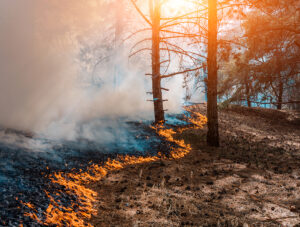Western US cities combine to combat ‘liability biomass’

A coalition of Western US cities and counties have been awarded awarded $335,000 (€308,000) to four projects designed to fight climate change and reduce wildfire risks.
These projects will convert waste, like forest debris, yard scraps, and biosolids into valuable products, with three of the four projects also reducing local wildfire risk.
Experts carefully selected these projects after reviewing them, focusing on their potential to address environmental issues both locally and globally.
The so-called 4 Corners Carbon Coalition - a group of cities and counties in the Western US - includes Albuquerque, New Mexico; Boulder County, Colorado; Flagstaff, Arizona; Santa Fe, New Mexico; and Salt Lake City, Utah.
These governments pool resources to fund CDR projects that spur local economic activity for this growing sector while also addressing regional environmental challenges.
Through a competitive application process, the coalition received nearly $2.15 million (€1.9 million) in funding requests.
After a two-month review period, four organisations were chosen for grants: Bioforcetech Inc., Carba Inc., Gila WoodNet, and Wood Cache PBC.
The selection was made with guidance from a committee that included experts from the Ecological Restoration Institute at Northern Arizona University, the National Renewable Energy Laboratory, Lawrence Livermore National Laboratory, RMI, and the Yale Carbon Containment Lab.
The liability biomass theme resonated strongly with all coalition communities. The changing climate of the American West is increasing the destructiveness and cost of wildfires.
In the past five years, both Colorado and New Mexico have experienced the most destructive fires in their states' histories.
The 2021 Marshall Fire tore through Boulder County, Colorado, on New Year’s Eve, destroying 1,000 homes, while the 2022 Calf Canyon/Hermits Peak Fire destroyed more than 903 structures east of Santa Fe, New Mexico.
“Wildfire prevention is crucial as we address the broader climate crisis,” said Susie Strife, Boulder County director of climate action. “These projects represent a significant step forward, transforming how we manage waste and mitigate risks, and setting a standard that could inspire global change.”
“This year’s focus on liability biomass has sparked some truly groundbreaking ideas,” said Nicole Antonopoulos, City of Flagstaff sustainability director. “Who would have imagined the realm of possibilities for integrating carbon removal with core municipal services like wastewater treatment or landfill operations? The potential impact and scale of these innovations is immense.”
“Managing the Rio Grande Bosque by addressing liability biomass is vitally important to the City of Albuquerque and communities who rely on the benefits of a thriving tree canopy,” said Ann Simon, City of Albuquerque sustainability officer and deputy director of policy. “The innovative projects in this campaign showcase scalable opportunities to mitigate climate change and help the City achieve its Climate Action Plan goals.”
“Protecting air quality is a top priority of Salt Lake City, and the CDR strategies being showcased by this year’s awardees present promising new solutions to mitigate the air quality risk posed by wildfire events,” said Peter Nelson, Salt Lake City sustainability department program manager. “As these CDR projects progress, Salt Lake City will be eager to share their successes with stakeholders in our region who can replicate these air quality solutions.”

















